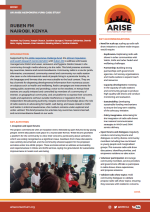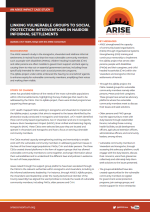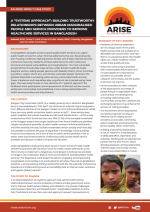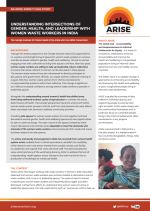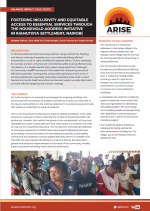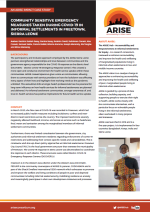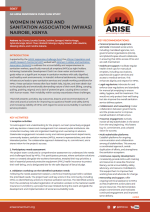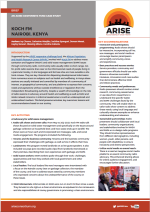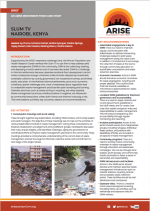Supported by the ARISE responsive challenge fund, the African Population and Health Research Centre (APHRC) worked with Ruben FM to address solid waste management (SWM) and water, sanitation and hygiene (WASH) issues in the community through media advocacy via the radio. This brief presents activities, key outcomes, lessons and recommendations. Community radio is a not-for-profit, […]
The ARISE research study in the Korogocho, Viwandani and Mathare informal settlements in Nairobi found that the most vulnerable community members such as people with disabilities (PWDs), children heading households (CHH) and older persons are often invisible to government support and lack agency, causing them to miss out on essential government services, including those specifically […]
In Bangladesh, equitable access to good quality health services is an urgent public health concern for urban informal settlements that are characterised by poor housing conditions, high population density, lack of basic essential services and tenure insecurity. Residents of these settlements live with continuous structural and spatial vulnerabilities and marginalisation. The most vulnerable groups (MVGs) […]
Through the ARISE programme, the George Institute India (TGI) supported the co-creation and strengthening of spaces for women waste workers to convene and discuss issues related to gender, health and wellbeing. This led to women engaging more with collectives to bring their issues to the fore. After four years, women waste workers are willing to […]
In informal settlements like Kiamutisya (Nairobi, Kenya), where fires, flooding, and disease outbreaks frequently occur, accurately identifying affected households is crucial for rapid and effective response efforts. Cholera outbreaks, for example, are best contained and controlled by swiftly locating affected areas. The absence of a reliable identification system poses significant challenges for Community Health Promoters […]
The participatory and inclusive approach employed by the ARISE Sierra Leone partners strengthened relationships and trust between communities and the government agency responsible for the COVID-19 response at the district level (DICOVERC – District COVID-19 Emergency Response Centre). This created a more open and conducive environment for health service uptake within these communities. ARISE created […]
An ARISE Case Study by Wairutu Jane, Milka Kori, Emily Wangari, Jacob Omondi and Joseph Kimani In informal settlements like Kiamutisya (Nairobi, Kenya), where fires, flooding, and disease outbreaks frequently occur, accurately identifying affected households is crucial for rapid and effective response efforts. Cholera outbreaks, for example, are best contained and controlled by swiftly locating […]
Supported by the ARISE responsive challenge fund, the African Population and Health Research Centre (APHRC) worked with Women in Water and Sanitation Association (WIWAS) to address the accountability and responsiveness to sanitation workers, specifically manual pit emptiers (MPEs) as right holders. Achieving Sustainable Development Goal 6 on clean water and sanitation goals relies on a […]
Supported by the ARISE responsive challenge fund, the African Population and Health Research Centre (APHRC) worked with Koch FM to address water, sanitation and hygiene (WASH), and solid waste management (SWM) issues through community radio. Community radio usually refers to short-range, not-for-profit radio stations that cater to the informational needs of people living in a […]
Supported by the ARISE responsive challenge fund, the African Population and Health Research Center worked with Slum TV to use film to help address solid waste management (SWM) in the community. SWM is the collecting, treating and disposing of solid material once it has been discarded. SWM is a challenge in informal settlements because: absentee […]
